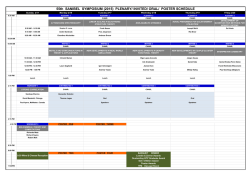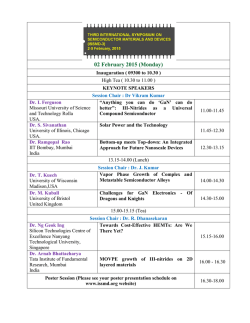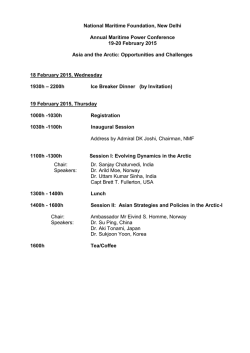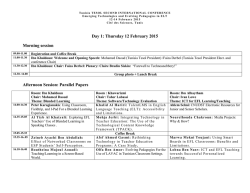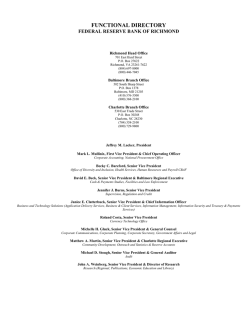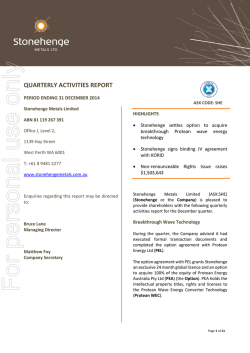
2015 World Energy Issues Monitor
For sustainable energy. 2015 World Energy Issues Monitor Energy price volatility: the new normal WORLD ENERGY COUNCIL CONSEIL MONDIAL DE L’ÉNERGIE Officers of the World Energy Council 2015 World Energy Issues Monitor Marie-José Nadeau Chair World Energy Council Younghoon David Kim Co-chair Klaus-Dieter Barbknecht Vice Chair Finance Leonhard Birnbaum Vice Chair Europe Oleg Budargin Vice Chair Responsibility for Regional Development José da Costa Carvalho Neto Chair Programme Committee Arup Roy Choudhury Vice Chair Asia Pacific/South Asia Jean-Marie Dauger Chair Communications & Strategy Committee Hasan Murat Mercan Vice Chair 2016 Congress, Istanbul Bonang Mohale Vice Chair Africa O.H. (Dean) Oskvig Vice Chair North America Brian A. Statham Chair Studies Committee José Antonio Vargas Lleras Vice Chair Latin America/Caribbean Wu, Xinxiong Vice Chair Asia Taha M. Zatari Vice Chair Special Responsibility Gulf States & Middle East Christoph Frei Secretary General Copyright © 2015 World Energy Council All rights reserved. All or part of this publication may be used or reproduced as long as the following citation is included on each copy or transmission: ‘Used by permission of the World Energy Council, London, www.worldenergy.org Published 2015 by: World Energy Council 62–64 Cornhill London EC3V 3NH United Kingdom Registered in England and Wales No. 4184478 VAT Reg. No. GB 123 3802 48 Registered Office 62–64 Cornhill, London EC3V 3NH ISBN: 978 0 946121 37 3 6 The Future Energy Leaders’ perspective 97 World Energy Council 2015 World Energy Issues Monitor The Future Energy Leaders’ perspective WEC’s Future Energy Leaders (FELs) are a global community of young professionals who share a commitment to shaping the global energy future. Made up of 100 carefully selected young professionals from diverse sectors, in over 40 different countries, WEC’s FELs represent the future of energy leadership. WEC FELs participate in network activities through a designated programme that enables them to further their experience, knowledge and skills in an energyfocused environment, contributing to WEC’s global dialogue and helping to shape energy solutions for tomorrow. WEC looks at its community of next generation leaders to inform the energy debate through their fresh thinking, innovative ideas and new approaches to business. Uncertainty Figure 47 WEC’s 2015 World Energy Issues Monitor: Future Energy Leaders Middle East dynamics Hydrogen economy Critical uncertainties Russia Climate framework Unconventionals Commodity prices Terrorism CCS Sustainable cities Electric vehicles Large-scale accidents Energy affordability Cyber threats Corruption Currency uncertainty Extreme weather risks Biofuels EU Cohesion Decentralised systems Brazil Nuclear Innovative regulation Energy prices Electric Energy-water storage nexus US policy Regional interconnection Energy subsidies Capital markets Renewable energies Global recession Trade barriers Energy Coal poverty Smart grids LNG China India Energy efficiency Large-scale hydro Talent Weak signals Action priorities Impact Macroeconomic Geopolitics & regional Business environment Vision & technology Size of bubble = level of urgency In line with rising geopolitical instability, WEC Future Energy Leaders (FEL) emphasised the recent tension between Russia and Ukraine as well as the Middle East Dynamics as critical uncertainties which could disrupt energy supply (Figure 47). These issues strike a contrast with the FEL analysis conducted in previous periods, as well as from the current world community view. On the demand side, the constant rise of India and China continue to be a major concern for both the FEL and greater world community. FELs put significant emphasis on a stable geopolitical environment, which they view as crucial to tackle energy-specific challenges. Year after year, the FELs Issues Monitor emphasises a higher degree of importance on sustainability and climate change than the world community. Not surprisingly, the climate framework, a proxy that consolidates multiple global efforts to reduce pollutants, remains 98 World Energy Council 2015 World Energy Issues Monitor one of the primary uncertainties. The perceived lack of collective commitment and international cooperation and the difficulty of establishing comparability and equivalence in heterogeneous policy frameworks contribute to this uncertainty. The FEL survey also puts greater emphasis than its global counterpart on related sustainability issues such as the energy-water-food nexus. It thus comes as a surprise that extreme weather events, generally believed to be partly a consequence of climate change, is seen as having a much lower impact by the FELs. In terms of consistent priorities, FELs pay much attention to advancements in electric storage that may have an outsized impact on the transition to a renewable and decentralised energy system. As storage technologies mature, variable electricity production can be smoothed and electric vehicles will become increasingly competitive. However, the development of such technologies will likely be accelerated only with the adoption of specific innovative energy regulation – an inter-connected issue that FELs see as critical. Energy prices remain a high-uncertainty issue for both the FELs and world community. They dictate access and affordability, but furthermore strongly influence the development and implementation of renewables and energy efficient systems, two other high impact issues. Surprisingly, FELs put less emphasis than the broader pool of global leaders on the challenges of volatile commodity prices and the effects of the global recession that may contribute to issues of energy poverty and inadequate energy access. In what is probably a testament to the passion of youth, the FELs Issues Monitor is consistently more polarised than that of the broader community, with issues being cast more readily to the edges of the chart. In conclusion, FELs call on young and senior energy leaders alike to address these critical issues on the road to a sustainable, inclusive, affordable and resilient energy system in the 21st century. World Energy Council 2015 World Energy Issues Monitor PROJECT PARTICIPATION Thanks go to all the WEC national member committees for their active participation in the development of the 2015 World Energy Issues Monitor. Further thanks go to the WEC regional Vice Chairs for their support in the regional assessments and to each of the energy leaders, experts and policymakers who kindly provided their insights on an anonymous basis. Principal Contributors/World Energy Council Christoph Frei (Secretary General), Latsoucabé Fall (Regional Manager, Africa), J.K. Mehta (Regional Manager, South Asia), Einari Kisel (Regional Manager, Europe), Paul Mollet (Regional Manager, Middle East, Gulf States and North Africa), Cristina Morales (Regional Manager, Latin America and the Caribbean), John Bourne (Senior Manager), Yoshiyuki Tsuji (Director), Stuart Neil (Senior Director), Andrea Buser (Coordinator) Contributing Member Committees for the National Monitoring and Assessment Austria, Belgium, Canada, Colombia, Estonia, France, Germany, Hungary, India, Indonesia, Italy, Japan, Latvia, Lebanon, Lithuania, Mexico, New Zealand, Namibia, Nigeria, Poland, Portugal, Romania, South Africa, Spain, Switzerland, Thailand, United Kingdom FEL Advisory Board Contributors Nathan Bittle (New Zealand), Bruno Benedetti (Canada), Anna Illarionova (Russia), David Livingston (United States) Project Management John Bourne (Senior Manager, World Energy Council) 99 Member Committees of the World Energy Council Algeria Hungary Philippines Argentina Iceland Poland Austria India Portugal Bahrain Indonesia Qatar Belgium Iran (Islamic Republic) Romania Bolivia Iraq Russian Federation Botswana Ireland Saudi Arabia Brazil Israel Senegal Bulgaria Italy Serbia Cameroon Japan Slovakia Canada Jordan Slovenia Chad Kazakhstan South Africa Chile Kenya Spain China Korea (Republic) Sri Lanka Colombia Kuwait Swaziland Congo (Democratic Republic) Latvia Côte d’Ivoire Libya Switzerland Croatia Lithuania Syria (Arab Republic) Cyprus Luxembourg Taiwan, China Czech Republic Mexico Tanzania Denmark Monaco Thailand Egypt (Arab Republic) Morocco Trinidad & Tobago Estonia Namibia Tunisia Ethiopia Nepal Turkey Finland Netherlands Ukraine France New Zealand United Arab Emirates Gabon Niger United Kingdom Germany Nigeria United States Ghana Pakistan Uruguay Greece Paraguay Zimbabwe Hong Kong, China Peru Lebanon Sweden Patrons of the World Energy Council Alstom GE Power and Water Saudi Aramco Bloomberg New Energy Finance Hydro-Québec Siemens AG Electricité de France Korea Electric Power Corp. Swiss Re Emirates Nuclear Energy Corporation Marsh & McLennan Companies Tokyo Electric Power Co. Oliver Wyman Verbundnetz Gas AG GDF SUEZ PricewaterhouseCoopers Formed in 1923, the World Energy Council is the UN-accredited global energy body, representing the entire energy spectrum, with more than 3000 member organisations located in over 90 countries and drawn from governments, private and state corporations, academia, NGOs and energy related stakeholders. The Council informs global, regional and national energy strategies by hosting high-level events, publishing authoritative studies, and working through its extensive member network to facilitate the world’s energy policy dialogue. Further details at www.worldenergy.org and @WECouncil To view the World Energy Issues Monitor online, scan below World Energy Council 62–64 Cornhill London EC3V 3NH United Kingdom T (+44) 20 7734 5996 F (+44) 20 7734 5926 E [email protected] www.worldenergy.org For sustainable energy. ISBN: 978 0 946121 37 3
© Copyright 2026
